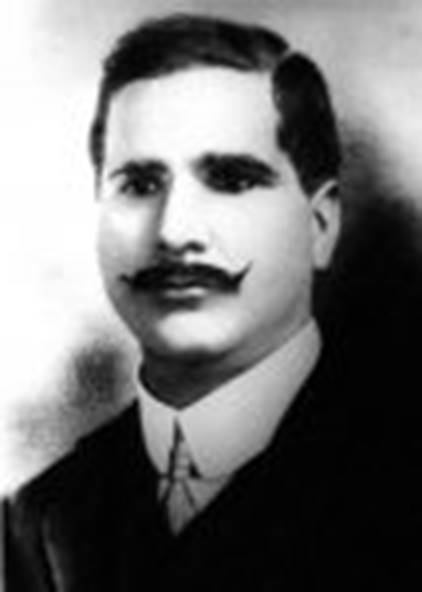
Arnold motivated Iqbal to pursue higher studies in the West. Iqbal had probably already begun the process of intellectually synthesizing the Eastern and Western traditions. In the fertile soil of Lahore, the sapling of Sialkot had become a sturdy tree
Allama Iqbal: Early Life in Lahore
By Prof Mustansir Mir
(Submitted by Prof Mohammad Soheyl Umar
Director for English Language and Professor
University of Central Punjab
Lahore)
2. Lahore (1895-1905)
In 1895, Iqbal moved to Lahore, beckoned by that city’s greener pastures of learning. A major city of the Punjab, Lahore was known for its educational institutions and cultural activities. Iqbal secured admission to the famous Government College, where he spent four years, obtaining a BA in 1897—studying English, philosophy, and Arabic—and an MA in philosophy in 1899. Soon afterward, he was appointed MacLeod Arabic Reader at Lahore’s Oriental College, where he taught history, philosophy, and economics and worked on research and translation projects. He held the post intermittently until 1904. For a short period, he also served as Assistant Professor of English at Government College and at one other college in the city.
In Lahore, Iqbal’s intellectual and literary talents blossomed. At Government College, he was exposed to the broad and vigorous tradition of European learning. Probably the most important influence on him was that of Sir Thomas Arnold (1864-1930), who had taught at Aligarh College before joining Government College in 1898. Quick to note Iqbal’s abilities, Arnold coached him in several ways. Besides teaching Iqbal formally, he motivated him to undertake several research projects. During his tenure as MacLeod Arabic Reader, Iqbal, encouraged by Arnold, wrote a research paper on the Muslim mystic ‘Abd al-Karim al-Jili’s concept of the Perfect Man, abridged and translated into Urdu two English books (one on early English history, the other on economics), and wrote the first Urdu book on the principles of economics.
Lahore boasted several literary societies, which met regularly and provided opportunities for both well-known and upcoming poets to present their work before the general public. Iqbal quickly established his credentials as a fine poet. At first, he dealt with the conventional themes of Urdu poetry—love, suffering experienced on separation from the beloved, desire to reunite with the beloved—employing, to that end, the typical and popular Urdu ghazal (a love poem in lyrical verse; literally, love-talk with women). A little later, he chose and perfected nazm (narrative verse) as the principal form his poetry was to take. But even as a writer of ghazals, Iqbal’s originality at times burst through the rigid framework of convention and his novel images gripped the audience’s attention, winning him acclaim from noted poets and critics of the time.
Three developments at this stage of Iqbal’s poetical career are significant. First, Iqbal’s poetry shows an increasing influence of English poetry, as attested, for example, by his many nature poems. But instead of making a clean break with the Indian tradition of Persianate Urdu poetry, Iqbal draws on the literary resources of that tradition in dealing with the themes he had borrowed from English poetry. This was a new experiment and was hailed as a breath of fresh air in the stifling atmosphere created by the styles of poetic composition then current in Urdu.
Second, influenced by English literature and European political thought, but also by the political developments within India, Iqbal begins to deal with themes of patriotism. His ‘National Song of India’ (BD, 83), which opens with ‘Our country India is the best in the whole world’, became immensely popular and was frequently sung in chorus, virtually like a national anthem, at schools and other gatherings across the country.
Third, Iqbal’s poetry receives a new direction through his association with the Anjuman-iHimayat-i Islam (Society for the Support of Islam). The Anjuman was established in 1884 with a view to promoting the welfare of India’s Muslims. Specifically, it offered financial support to students, established libraries and orphanages, and helped widows and poor people to stand on their own feet by giving them vocational training. It also set up a printing press to produce Islamic literature. The Anjuman’s annual fund-raising events were attended by both distinguished national figures and the general public. At these meetings, speeches were made on important national and community issues and poems were read that appealed to religious sentiments. At the annual meeting of 1900, Iqbal read his poem ‘The Orphan’s Lament’, which so moved the audience that he was asked to reread it. Thanks in part to Iqbal’s poem, the Anjuman’s fund-raising event that year was more than successful.
In Lahore, much more extensively than in Sialkot, Iqbal was exposed to the two traditions of Eastern and Western learning. This can be seen in the subjects he formally studied at Government College—Arabic, English, and philosophy. As in Sialkot, so in Lahore Iqbal found an able mentor: the precious stone discovered by Mir Hasan in Sialkot was polished into a glittering jewel by Arnold in Lahore. Under Arnold’s affectionate patronage, Iqbal the poet now also became Iqbal the academic. Iqbal’s studies, writings, and interests came to have remarkable diversity: he taught English, philosophy, history, and economics at several colleges and his writings included treatments of equally diverse subjects. Arnold motivated Iqbal to pursue higher studies in the West. Iqbal had probably already begun the process of intellectually synthesizing the Eastern and Western traditions. In the fertile soil of Lahore, the sapling of Sialkot had become a sturdy tree. (Continued next week)

